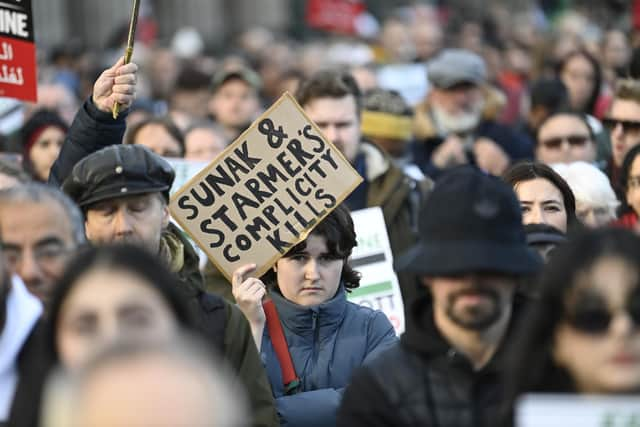The rising toll of civilian deaths in the Middle East is only likely to make peace harder - William Bell
UN Secretary-General António Guterres was right to remind the world of the “suffocating occupation” that Palestinians experience. He was also right not to excuse Hamas for their barbaric attack.
Every year aid agencies warn of Palestinian families displaced and increasing violence. Poverty and unemployment rates in a blockaded Gaza have been amongst the world’s highest. Violence, collective punishment and impunity is the norm. And yet the international community pays lip service through aid, rather than the more difficult and ultimately only option of delivering a just settlement.
Advertisement
Hide AdAdvertisement
Hide AdFor Israelis, and Jews worldwide, that bloody Saturday no doubt reminds them of the lethal threats that have accompanied them through much of their history. Not least European Jews, who experienced slaughter on an industrial scale in the Holocaust. Neither Israeli nor Palestinian political leaders seem capable, however, of breaking this cycle of violence. Sadly, the international community is adopting the same ineffectual approach. Innocent Palestinian and Israeli civilians are paying with their lives.


Thousands of lives have already been lost, many of them children. Many more will be at risk unless a very different approach is taken. An approach that condemns unequivocally the use of violence against innocent civilians, but also condemns the erosion of basic humanity and dignity that comes with occupation.
It is essential that we are able to talk about both these things without an accusation of excusing atrocity. Palestinians and Israelis are locked in an asymmetric, dysfunctional, and destructive relationship. But neither population is going anywhere. Both need to recognise that the more they pursue an exclusive claim to the land between the Jordan River and the Mediterranean, the greater the death and destruction. But that requires global political leadership too.
The relationship between Israelis and Palestinians is often defined by inequality and impunity because of an international political failure to act on that aspiration.
Advertisement
Hide AdAdvertisement
Hide AdAny advances and progress that were made with the Oslo Peace Process were squandered by an international community which focused more on the White House ceremony than on how these two peoples, with their respective trauma and grievance, would make peace. Take the illegal settlements, for example. In 1993, there were approximately 230,000 Israeli settlers living in illegal settlements in the occupied West Bank – land on which a Palestinian state was envisaged. Today there are more than 600,000. Governments, including the UK, recognise both the illegality of the settlements and their impact on Palestinian economic development but they have failed to challenge Israeli actions.
None of that justifies the killing of young Israelis at a festival or the kidnapping of toddlers and pensioners. Israel has the same right as any country to self-defence. Yet if history is a guide, then the devastation of Gaza and the rising toll of civilian deaths is only likely to make peace harder.
William Bell is head of Middle East policy and advocacy at Christian Aid.